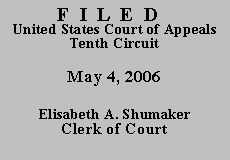

|
UNITED STATES OF AMERICA,
v.
RALPH MERCADO |
(D.C. Nos. 04-CV-3067-KHV and 01-CR-20147-01-KHV) |
Before MURPHY, SEYMOUR and McCONNELL, Circuit Judges.
Pursuant to the terms of a plea agreement, Mercado pleaded guilty to assaulting a federal correctional officer in violation of 18 U.S.C. § 113(a)(4). Mercado was sentenced to six months' incarceration. Although Mercado waived his right to appeal or collaterally challenge his conviction and sentence as part of his plea agreement, he filed the instant § 2255 motion on February 25, 2004. In the motion, Mercado raised one claim; that the ineffective assistance of his two attorneys rendered his guilty plea unknowing and involuntary. Specifically, Mercado asserted his first attorney retained a private investigator who obtained the names of other inmates allegedly willing to testify on his behalf. According to Mercado, the testimony of these witnesses would support his assertion that he acted in self-defense. Mercado alleged his first attorney was ineffective for not forwarding the information and his second attorney was ineffective for not requesting it. He also alleged he would not have pleaded guilty if he had known witnesses had been identified.
The district court concluded the waiver in Mercado's plea agreement was not enforceable as to his ineffective assistance claim. See United States v. Cockerham, 237 F.3d 1179, 1187 (10th Cir. 2001) ("[A] plea agreement waiver of postconviction rights does not waive the right to bring a § 2255 petition based on ineffective assistance of counsel claims challenging the validity of the plea or the waiver."). The court, however, also concluded Mercado had failed to provide a sufficient factual basis for his assertion counsels' alleged deficient performance affected the outcome of the plea process. See Miller v. Champion, 262 F.3d 1066, 1072 (10th Cir. 2001). The district court did not dismiss Mercado's § 2255 motion, but provided Mercado with an opportunity to file affidavits of the alleged witnesses establishing (1) whether the individuals witnessed the assault that formed the basis for the charge against Mercado, (2) that they were willing to testify, and (3) the nature of their proposed testimony. The court appointed counsel to assist Mercado in obtaining the affidavits.
On April 20, 2005, the court issued a show cause order requesting counsel to advise the court regarding the status of the proposed affidavits. Counsel responded on June 1, 2005 and June 13, 2005 informing the court he was unable to contact one alleged witness and had received no response from the other four witnesses. The district court then denied Mercado's § 2255 motion, concluding he had failed to provide sufficient evidence to support his ineffective assistance claim.
In his application for a COA and appellate brief, Mercado does not challenge the district court's conclusion his claim was not supported by any evidence. Instead, he asserts his postconviction counsel was ineffective for failing to obtain the affidavits. We must reject Mercado's argument because a petitioner has no constitutional right to counsel in postconviction proceedings. See Pennsylvania v. Finley, 481 U.S. 551, 555 (1987); Thomas v. Gibson, 218 F.3d 1213, 1222 (10th Cir. 2000).
To be entitled to a COA, Mercado must make "a substantial showing of the denial of a constitutional right." 28 U.S.C. § 2253(c)(2). To make the requisite showing, he must demonstrate "that reasonable jurists could debate whether (or, for that matter, agree that) the petition should have been resolved in a different manner or that the issues presented were adequate to deserve encouragement to proceed further." Miller-El v. Cockrell, 537 U.S. 322, 336 (2003) (quotations omitted). In evaluating whether Mercado has satisfied his burden, this court undertakes "a preliminary, though not definitive, consideration of the [legal] framework" applicable to each of his claims. Id. at 338. Although Mercado need not demonstrate his appeal will succeed to be entitled to a COA, he must "prove something more than the absence of frivolity or the existence of mere good faith." Id.
Having undertaken a review of Mercado's application for a COA and appellate filings, the district court's order, and the entire record on appeal pursuant to the framework set out by the Supreme Court in Miller-El, this court concludes Mercado is not entitled to a COA. The district court's resolution of Mercado's § 2255 motion is not reasonably subject to debate and the issues he
seeks to raise on appeal are not adequate to deserve further proceedings. Accordingly, this court denies Mercado's request for a COA and dismisses this appeal.
Entered for the Court
ELISABETH A. SHUMAKER, Clerk
By
Deputy Clerk